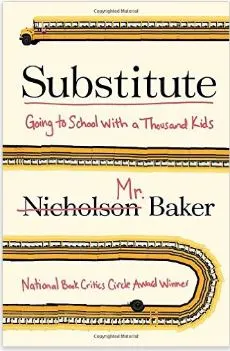A couple of weeks ago I grabbed Nicholson Baker’s Substitute: Going to School with a Thousand Kids off the new book shelf at the library, and gradually managed to slog my way through it in between dips into cookbooks and various other reading material. Yes, I said slog: Baker is, of course, a fantastic writer and many of the individual stories of his interactions with students are both funny and enlightening, but this particular book could easily have been half as long. It definitely would have benefited from less play-by-play and more analysis to tie the narrative and its underlying message together; as it stands, it’s more like a lengthy diary of his time as a sub than anything else.
So, what’s the schtick here?
Back in 2014, Baker takes a short substitute teacher orientation course, passes the background check, and spends several months chronicling his experiences as an on-call substitute teacher for multiple grade levels in his local Maine public school district. When I say chronicling, I mean: Chronicling — day-by-day and play-by-play, resulting in over 700 pages covering a total of just 28 days in the classroom. This focus on everyday observations and conversations is fascinating at the outset, but starts to wear thin after a while. He’s likely making a point about the tedium inherent in the typical public school classroom, but seems to forget that adult readers aren’t the same type of captive audience as the students he describes.
Interesting, yet frustrating
Baker’s asides and thoughts about the state of the public education system in this country also begin to wear thin, as he drops observations throughout the book without any real or thorough exploration of what it might take to remedy the deficiencies he points out. Even in cases where I agree with him (such as his frustration with kids’ slogging their way through more advanced math concepts without ever mastering the basics, like the times tables, that they need to solve problems), he just drops these thoughts as an aside in the larger moment-by-moment narrative and then moves on.
What would it take to change things? How, specifically, can schools effectively engage and educate kids in the social media age? How can technology be used effectively in the classroom, and where is it of less benefit? You get a fairly clear idea of public schools’ (or at least this limited set of schools’) challenges through Baker’s observations and descriptions, but you get almost nothing about solutions. You get the sense that he considers himself superior to most of the teachers he meets, with little indication that he appreciates their training, the challenges of getting a class through an entire school year, the relationships they build with the students in their classes, or the standards they’re expected to meet.
A sub isn’t the same as a full-time teacher
Baker actually says it himself at one point,
The thing that’s hard — I’m sorry to interrupt you guys, but I’m lonely — the thing that’s hard is that if you are a regular teacher, you actually have to get the kids to learn something. That’s hard. A substitute can just enjoy it. People say funny things, do amazing projects, and I just take it in.
While the concept of subbing in various classrooms to build a snapshot of the current state of our school system is interesting, Baker just dips into the lives of these kids. He doesn’t live with any given class throughout the entire school year, and himself mentions repeatedly the ways in which students’ behavior and interactions differ on days that a sub is in their classroom. Kids take advantage of a sub and are less likely to focus — no kidding!
Introspection, please…
It’s hard to form a true impression of the state of the educational system as a one-time observer in any given class, and it’s harder to form a true impression of what needs to be done after a total of just 28 days in the classroom in a single school district (with age groups from kindergarten through high school, no less). Baker doesn’t even bother to include a final chapter summarizing and drawing his experiences together; he just ends the book with one last play-by-play of his last day, no introspection needed. I really expected and wished for more from Substitute; not recommended.
What are you reading this week?
What have you been reading lately? Tell us about it! ? — and, you can browse all the What’s Rachel Reading? book reviews here.


